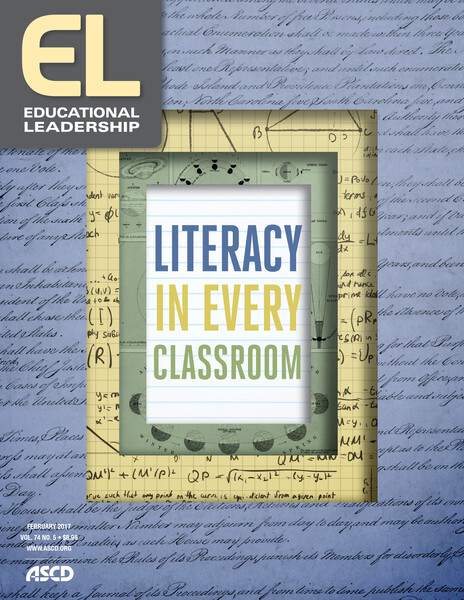Articles in this issue explore what skills are most essential to solid reading and writing, and how to work these skills effectively into any content area lesson.
Is Arguing Essential?
Mary Ehrenworth ("Why Argue?,") maintains that a skill students need in every content area and will need in life is argumentation. Facility in arguing a point, she believes, is "a pathway to success in virtually every academic discipline."
Do you agree that argumentation is a skill we should make sure students have?
- Look over the strategy of "flash debating" Ehrenworth describes and the <LINK URL="http://www.ascd.org/publications/educational-leadership/feb17/vol74/num05/Why-Argue%C2%A2.aspx#el0217_talkprotocol">Argument Talk Protocol</LINK> these quick debates often follow. Try several of these flash debates with your students, on any topic (<LINK URL="http://www.ascd.org/publications/educational-leadership/feb17/vol74/num05/Why-Argue%C2%A2.aspx#el0217_talkprotocol">see the list of potential topic ideas</LINK>).
- Review and discuss (with older students especially) the nine skills Ehrenworth lists as key to making an effective argument. You might direct students to work specifically on one or two of these specific skills in their practice debates. Report to your group how students respond to doing flash debates. In evaluating flash debates, notice which of these nine skills kids they seem to have the most trouble with–and you'll need to strengthen.
What's in Knowledge of a Word?
If we're honest, we'll admit that few students get excited when it's time for vocabulary instruction—and teachers probably don't find these lessons too engaging either. Yet as Timothy Rasinski and colleagues note in "The Roots of Comprehension," 80 percent of students' reading comprehension test scores can be accounted for by vocabulary knowledge, so building students' word knowledge is essential.
Rasinski, Padak, and Newton posit a good alternative to teaching academic vocabulary through lists of isolated words and memorization: teach commonly occurring Greek and Latin roots and show kids how to analyze and infer meaning from the structure of words in general. Students then have a way to crack open the meaning of unknown words—by breaking the word into its components and guessing meaning from the parts' meanings.
- What do you remember from your student days about how vocabulary was taught—and how effective the method was?
- Share with other teachers how you give your students instruction in vocabulary. Do you use lists of words that aren't connected morphologically? Have kids memorize dictionary definitions? How do students respond?
- Try at least the first two parts of the three-day routine for using Greek and Latin roots to boost vocabulary that Rasinski and colleagues describe. Why not assign your students to find a list of words that contain whatever target word root you choose—and have them research the definition and morphological history of several words?
Paula Bourque's online piece "Building Stamina for Struggling Readers and Writers" notes that to help poor readers build resilience so they'll practice more, we must provide just enough scaffolding—including in terms of vocabulary.
- Look over Bourque's description of two different ways to prepare students to read "The Raven," especially how to support readers' understanding of the old-fashioned words in the poem. How does the second teacher she describes prepare students more solidly for vocabulary exploration?
- Consider a text or video you plan to present to learners that contain unusual vocabulary. How might you pre-teach to help students unlock these terms for themselves as they read?
Getting Them to Write More
Here's what ELA teacher Kelly Gallagher ("The Writing Journey,") says teachers he works with tell him about student writing:
I start each workshop by asking the same question: How many of you are seeing a decline in your students' writing abilities? Sadly, no matter where I'm presenting or what the demographic of their students, teachers' responses overwhelmingly confirm my worst fears: Wide swaths of students are not developing their writing skills—skills we know to be foundational to their literate lives.
Do you agree that many K–12 students have poor writing skills?
- Consider what Gallagher points out (<LINK URL="http://www.ascd.org/publications/educational-leadership/feb17/vol74/num05/The-Writing-Journey.aspx#el0217_fig1">in the chart</LINK>) about few class assignments involving serious, drawn-out writing tasks. Is this true in your school?
- Have you noticed a decline in your students' writing skills in the past 10 years or more? Share with the group what you perceive.
To get reluctant, nonconfident writers to write more:
Try "interactive writing" techniques in which teacher and students compose collaboratively, taking turns "sharing the pen." This technique is described at the Reading Rockets website.
Paul Bambrick-Santoyo and Stephen Chiger ("Until I Write it Down,") say that teachers often use writing more as an assessment of what students know than as a way for students to understand more about what they read or to deepen thinking. They recommend that teachers depart from the usual sequence of students reading a text silently, discussing it as a group, then writing their thoughts individually.
- Read their description of a lesson that flips this script: learners read a text, then write individual written reflections in response to a prompt, then discuss as a class. Try this flip-around with your students. Did this help you see more clearly what kids do and don't understand in this text? Did it deepen comprehension?

